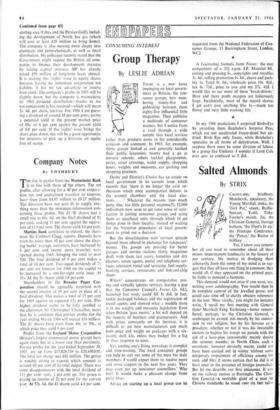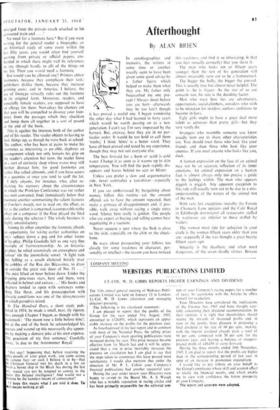Salted Almonds
By STRIX
CAGOULARD, bradbury, Menshevik, speakeasy, the Young Marshal, stuka, the `Girl Pat,' snoek, Baillie- Stewart, Yadil, Tishy, Fowler's match, Jix, the Christian General, barrage balloon, 'the Fleet's lit up,' the Prinkipo Conference, the 'Panay,' the Rector of Stiffkey . .
Yes, I know you remem- ber all you need to remember about all these minor, impermanent landmarks in the history of our century. My motive in dredging them arbitrarily from the sump of my mind is to sug- gest that they all have one thing in common; they would all, if they appeared on the printed page, be liable to demand a footnote.
This demand would not arise if you were, say, writing your autobiography. You would then be in complete control of the jewelled prose, and could take time off to clarify obscure references in the text. 'How vividly,' you might for instance write, 'I recall my first meeting with General (later Marshal) Feng Yu-hsiang—better remem- bered, perhaps, as the Christian General, a soubriquet he earned, not merely by his conver- sion to our religion, but by his fervour as a ' proselyte; whether or not it was his invariable. custom to baptise his troops on parade with the ' aid of a hose-pipe (presumably mainly during the summer months; in North China such a ceremony, however devoutly meant, could not have been carried out in winter without some temporary impairment of efficiency among the 'rank and file), it seems certain that he did it at least once in the presence of foreign journalists. But let me describe our first encounter. It was on the railway station at Paotingfu. The Chris- tian General—a veritable giant of a man by Chinese standards; he stood over six feet tall—.
emerged from the private coach attached to his armoured train and . .
No need for a footnote here.* But if you were writing for the general reader a biography, or an historical study of some event within the last fifty years, you would often find yourself quoting from private or official papers, em- bedded in which there might well be references to any (though hardly to all) of the things on my list. Then you would need a footnote.
But would you be allowed one? Printers abhor footnotes, because they complicate their task; publishers dislike them, because they increase printing costs; and in America, I believe, the use of linotype virtually rules out the footnote in its original form. Moreover, readers, and especially female readers, are supposed to have an allergy for them. Nowadays the chances are that you will be compelled to divorce your foot- notes from the passages which they elucidate and lump them all together in a sort of pound at the end of the book.
This is against the interests both of the author and of his reader. The reader objects to having to look things up, as though he were back at school.. The author, who has been at pains to make his footnotes as interesting as possible, deplores an arrangement which not only loosens his grip on the reader's attention but turns the reader loose in a sort of curiosity shop whose wares may still further distract him; for good footnotes are rather like salted almonds, and if you have access to a quantity at once you tend to scoff the lot.
I defy anyone, for instance, who, after re- freshing his memory about the circumstances in which the Prinkipo Conference was (or rather was not) convened, finds immediately below that footnote another summarising the salient features of Fowler's match, not to read on; the effect, as far as the author is concerned, iscomparable tothe effect on a composer if the flute played the final coda during the scherzo.f The whole business is highly unsatisfactory.
Among its other amenities the footnote affords an opportunity for taking earlier authorities on one's subject down a peg and for other forms of by-play. Philip Guedalla left us one very fine example of footnotemanship. As an historio- grapher, he relied extensively on atmosphere and 'colour' (in the journalistic sense). `A light rain uas falling as a coach clattered briskly over the cobbles of the Rue des Ekcassines, to draw up outside the great oak door of No. 31 . . 'The mist lifted an hour before dawn. Under the dripping pine-trees stars, here and there, were reflected in helmet and cuirass ...' His books and chapters tended to open with sentences some- thing like these, and his preoccupation with climatic conditions was one of the idiosyncrasies on which parodists seized.
In The Hundred Days, a short study pub- lished in 1934, be made a small, neat, sly riposte. Sure enough Chapter I began, as though with his trademark: 'The moon rose a little before nine'; but at the end of the book he acknowledged his sources and wound up this necessarily dry appen- dix by making a demure joke at his own expense. The precision of my first sentence,' Guedalla %rote, 'is due to the Astronomer Royal.'
* But stay! Supposing that, before receiving the [alley-proofs of your great work, you came across the curious fact—or such I believe it to be—that the Christian General met his death in a fire on board a Soviet ship in the Black Sea during the last rear: would you not be tempted to convey to the leader this belated intelligence? And would not a Footnote be the handiest means of conveyance?
t1 hope this means what I am told it does. To it means nothing at all.



































 Previous page
Previous page